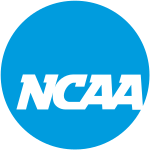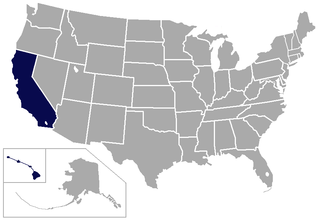
The Big West Conference (BWC) is an American collegiate athletic conference whose member institutions participate in the National Collegiate Athletic Association's Division I. The conference was originally formed on July 1, 1969, as the Pacific Coast Athletic Association (PCAA), and in 1988 was renamed the Big West Conference. The conference stopped sponsoring college football after the 2000 season.

The NACDA Directors' Cup, known for sponsorship reasons as the NACDA Learfield Directors' Cup or simply as the Directors' Cup, is an award given annually by the National Association of Collegiate Directors of Athletics to the colleges and universities in the United States with the most success in collegiate athletics. Points for the NACDA Directors' Cup are based on order of finish in various championships sponsored by the National Collegiate Athletic Association (NCAA) and the National Association of Intercollegiate Athletics (NAIA) or, in the case of Division I Football, media-based polls. A first-place finish in a sport earns 100 points, second place 90 points, third place 85 points, fourth place 80 points, and lesser values for lower finishes. The award originated in 1993 and was presented to NCAA Division I schools only. In 1995 it was extended to Division II, Division III, and NAIA schools as well, then extended further to junior colleges in 2011 based on standings from the NATYCAA Cup. Each division receives its own award.

The NCAA Men's Water Polo Championship is an annual tournament to determine the national champion of NCAA men's collegiate water polo. Beginning in 1969, it has been held every year except 2020, when it was postponed to March 2021 because of the COVID-19 pandemic. With a limited number of NCAA water polo programs at the national level, all men's teams, whether from Division I, Division II, or Division III, are eligible to compete each year in the National Collegiate tournament. The tournament was expanded from a four-team bracket in 2013 by adding two play-in games that are contested by the bottom four seeds, effectively creating a six-team bracket with a first-round bye for the top two teams. This makes it the sport with the fewest teams reaching the NCAA tournament; this is because there are only 43 men's water polo teams between all three NCAA divisions.

The NCAA Women's Water Polo Championship has existed since the 2001 season. Seven conferences have teams competing in women's water polo: the Big West Conference, the Collegiate Water Polo Association (CWPA), the single-sport Golden Coast Conference, the Metro Atlantic Athletic Conference (MAAC), the Mountain Pacific Sports Federation (MPSF), the Southern California Intercollegiate Athletic Conference (SCIAC) and the Western Water Polo Association (WWPA). Some teams compete at Division III either as members of the Southern California Intercollegiate Athletic Conference or independently. Teams qualify by either winning their respective conference tournament or receiving one of the few at large bids available. Unlike most NCAA sports, only one National Collegiate championship is held each season with teams from Division I, Division II, and Division III competing together.

The UCLA Bruins are the athletic teams that represent the University of California, Los Angeles. The Bruin men's and women's teams participate in NCAA Division I as part of the Pac-12 Conference and the Mountain Pacific Sports Federation (MPSF). For football, they are in the Football Bowl Subdivision of Division I. UCLA is second to only Stanford University as the school with the most NCAA team championships at 120 NCAA team championships. UCLA offers 11 varsity sports programs for men and 14 for women.
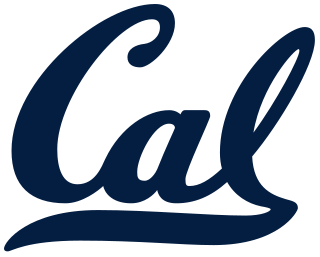
The California Golden Bears are the athletic teams that represent the University of California, Berkeley. Referred to in athletic competition as California or Cal, the university fields 30 varsity athletic programs and various club teams in the National Collegiate Athletic Association (NCAA)'s Division I primarily as a member of the Pac-12 Conference, and for a limited number of sports as a member of the Mountain Pacific Sports Federation (MPSF). Over the course of the school's history, California has won team national titles in 13 men's and 3 women's sports and 111 team titles overall. Cal athletes have also competed in the Olympics for a host of different countries. Notable facilities used by the Bears include California Memorial Stadium (football) and Haas Pavilion. Cal finished the 2010–11 athletic season with 1,219.50 points, earning third place in the Director's Cup standings, the Golden Bears' highest finish ever. Cal did not receive any points for its national championships in rugby and men's crew because those sports are not governed by the NCAA. Cal finished 12th in the 2014-15 standings.
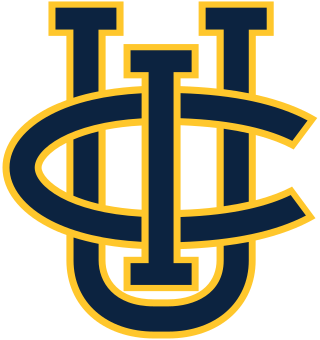
The UC Irvine Anteaters are the athletic teams fielded by the University of California, Irvine. Its athletics programs participate in the NCAA's Division I, as members of the Big West Conference and the Mountain Pacific Sports Federation. For earlier years of the school's existence, the teams participated at the Division II level with great success as explained below.

The San Diego State Aztecs are the athletic teams that represent San Diego State University (SDSU). San Diego State currently sponsors six men's and eleven women's sports at the varsity level.

The UC Santa Barbara Gauchos are the intercollegiate athletic teams who represent the University of California, Santa Barbara. Referred to in athletic competition as UC Santa Barbara or UCSB, the Gauchos participate in 19 NCAA Division I intercollegiate sports with the majority competing in the Big West Conference. UCSB currently fields varsity teams in 10 men's sports and 9 women's sports.

The UC San Diego Tritons are the athletic teams that represent the University of California, San Diego. UC San Diego has 23 varsity sports teams and offers student participation in a wide range of sports. As of July 1, 2020, all UC San Diego teams participate at the NCAA Division I (DI) level in the Big West Conference. During their time in NCAA Division II and the California Collegiate Athletic Association starting in the 2000–01 season, UCSD placed in the top 5 in the Division II NACDA Directors' Cup standings nine times, including three 2nd-place finishes. NCSA Athletic Recruiting ranked the Tritons as the nation's top Division II program for eight consecutive years.
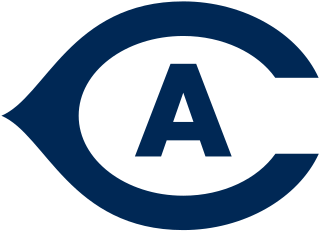
The UC Davis Aggies are the athletic teams that represent the University of California, Davis.

Long Beach State athletics, or simply Beach athletics, are the athletic teams that represent California State University, Long Beach. Teams compete in 19 sports at the National Collegiate Athletic Association (NCAA) Division I level. Long Beach State is a founding member of the Big West Conference, and also competes in the Mountain Pacific Sports Federation and the Golden Coast Conference for sports not sponsored by the Big West.

The Cal State Bakersfield Roadrunners are the intercollegiate athletic teams representing the California State University, Bakersfield, located in Bakersfield, California. The Roadrunners compete at the National Collegiate Athletic Association (NCAA) Division I level as a member of the Big West Conference.

The Cal State East Bay Pioneers are the athletic teams that represent California State University, East Bay, located in Hayward, California, in intercollegiate sports as a member of the Division II level of the National Collegiate Athletic Association (NCAA), primarily competing in the California Collegiate Athletic Association (CCAA) for most of their sports since the 2009–10 academic year; while its women's water polo teams compete in the Western Water Polo Association (WWPA). The Pioneers previously competed in the California Pacific Conference of the National Association of Intercollegiate Athletics (NAIA) from 1998–99 to 2008–09.

The Cal State Monterey Bay Otters are the athletic teams that represent California State University, Monterey Bay, located in Monterey County, California, in intercollegiate sports as a member of the Division II level of the National Collegiate Athletic Association (NCAA), primarily competing in the California Collegiate Athletic Association (CCAA) for most of its sports since the 2004–05 academic year; while its women's water polo teams compete in the Western Water Polo Association (WWPA). The Otters previously competed in the California Pacific Conference (CalPac) of the National Association of Intercollegiate Athletics (NAIA) from 1996–97 to 2003–04.

The Cal State San Bernardino Coyotes are the men's and women's intercollegiate athletic squads of California State University, San Bernardino. The athletic department was established in 1984 and the school's athletic mascot is the Coyote. The school's official colors are blue and black.

The Sonoma State Seawolves are the athletic teams that represent Sonoma State University, located in Rohnert Park, California, in NCAA Division II intercollegiate sports. The Seawolves compete as members of the California Collegiate Athletic Association for all 13 varsity sports except for women's water polo, which competes in the Western Water Polo Association and men's and women's tennis, which compete in the Pacific West Conference.

The UC Santa Cruz Banana Slugs are the athletic teams that represent the University of California, Santa Cruz. The Banana Slugs compete in Division III of the NCAA, mostly in the Coast to Coast Athletic Conference (C2C). There are fifteen varsity sports – men's and women's basketball, tennis, soccer, volleyball, swimming and diving, cross country, and women's golf. UCSC teams have been Division III nationally ranked in tennis, soccer, men's volleyball, and swimming. UCSC maintains a number of successful club sides.
The following is a list of National Collegiate Athletic Association college water polo teams from all divisions that qualified for the NCAA Men's Water Polo Championship since its debut in the 1969–70 school year. The list features the qualified schools along with appearances, years, active streak, debut, last, and best result. From 1969 to 1994, the tournament featured a round of eight-team bracket and a single-elimination format along with consolation. From 1994 to 2012, the tournament consisted of only a four-team bracket with a semifinals, third place, and championship match. Since 2012, the tournament had teams qualifying from the first round to semifinals based on regular season performance and other measures.

The 2018 NCAA Men's Water Polo Championship occurred from November 24th, 2018 to December 2nd, 2018 in Stanford, California at the Avery Aquatic Center. This was the 50th NCAA Men's Water Polo Championship. Eight teams across from all divisions participated in this championship.
